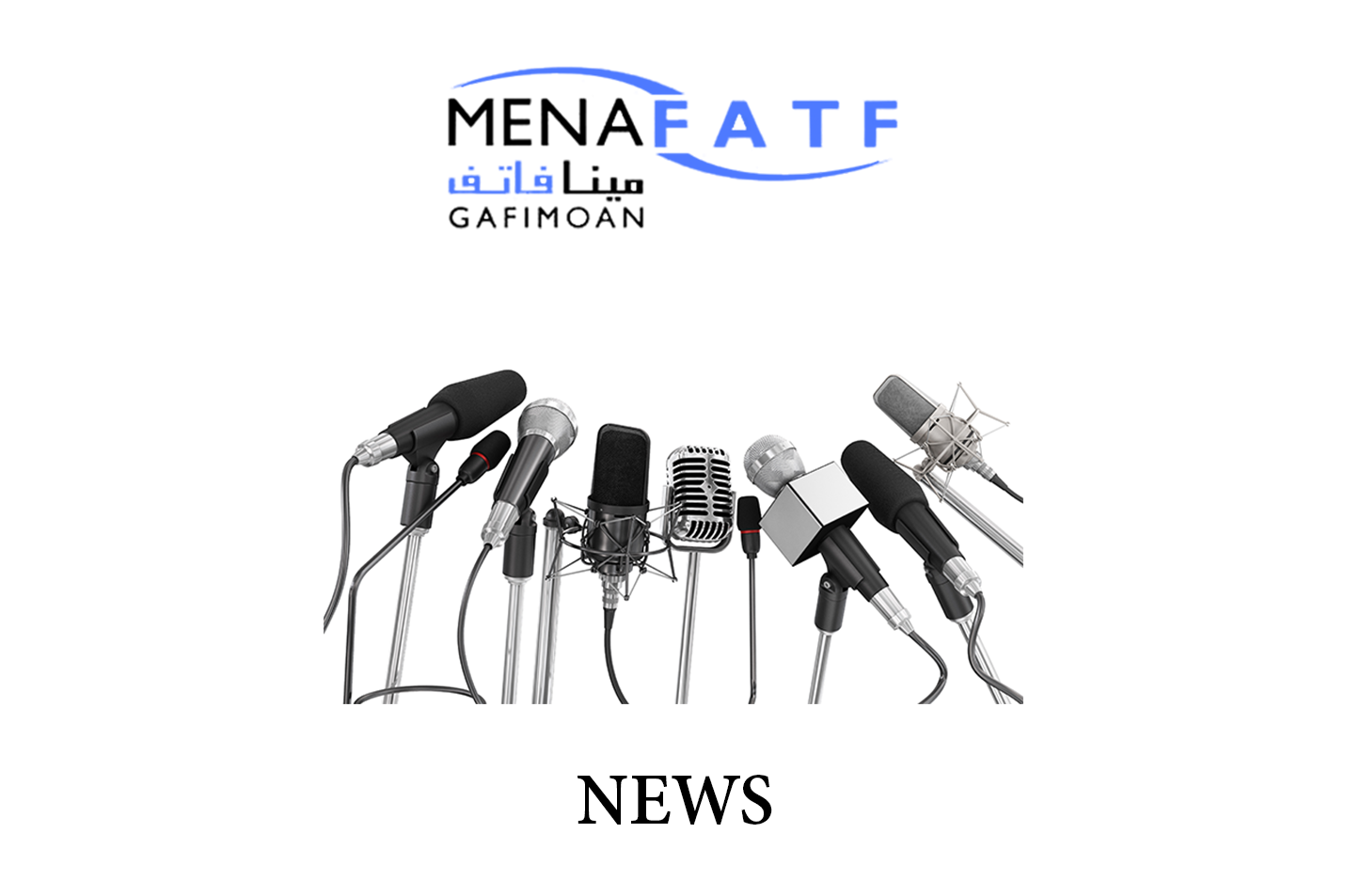MENAFATF 23rd Plenary Meeting to Combat Money Laundering and Terrorist Financing was concluded on Thursday, April 28, 2016. The Plenary Meeting was held in Doha, State of Qatar, for three consecutive days starting April 26, 2016 and was chaired by the State of Qatar represented by H.E Sheikh Fahad bin Faisal Al Thani, Deputy Governor of the Central Bank of Qatar, Chairman of the National Anti-Money Laundering and Terrorism Financing Committee and President of MENAFATF.
The Plenary Meeting was attended by a large number of AML/CFT experts from seventeen Arab States (Hashemite Kingdom of Jordan, United Arab Emirates, Kingdom of Bahrain, Republic of Tunisia, People's Democratic Republic of Algeria, Kingdom of Saudi Arabia, Republic of Sudan, Republic of Iraq, Sultanate of Oman, State of Palestine, State of Qatar, State of Kuwait, Republic of Lebanon, State of Libya, Arab Republic of Egypt, Kingdom of Morocco and Islamic Republic of Mauritania). The Plenary Meeting was also attended by representatives of several countries and bodies that have observer status (Republic of France, United Kingdom, United States, International Monetary Fund, World Bank, Cooperation Council for the Arab States of the Gulf, Financial Action Task Force (FATF), United Nations (UN), Egmont Group, Arab Monetary Fund and Eurasian Group).
During the three days preceding the Plenary Meeting, from Saturday until Monday, MENAFATF held the MEWG and TATWG meetings, the FIUs Forum and the NRA Committee meeting as well as other meetings.
H.E Qatari Minister of Finance, Mr. Ali Shareef Al Emadi, opened the Plenary Meeting with a speech in which he welcomed the attendees and participants, highlighted Qatar’s commitment to support MENAFATF and international efforts made to combat money laundering and terrorist financing and called for promoting the principles of integrity and transparency. He added that Qatar is in the process of establishing a specialized training center to combat money laundering and terrorist financing. This center will play a major role in raising awareness and improving the level of operation of all stakeholders locally, regionally and internationally.
H.E. FATF President, Mr. Je-Yoon Shin, referred in his speech to the basic components of FATF strategy to combat terrorist financing, calling for their constant reinforcement and stressing on the need to implement FATF standards. He also affirmed that the mutual evaluation is an opportunity to benefit from the experiences of the countries under evaluation.
In his speech, H.E. Dr. Abdul Rahman AlHamidy, Director General and Chairman of the Arab Monetary Fund, praised the leading and distinguished role of MENAFATF as well as its concrete efforts and achievements in combating and raising awareness about money laundering and terrorist financing. He also praised the progress made by the Arab countries to comply with the relevant international recommendations and resolutions. He stressed on the Arab Monetary Fund’s aspiration to cooperate with MENAFATF, the Arab countries or any of the observers in order to raise awareness about these issues by organizing training sessions and workshops that contribute in qualifying and building Arab cadres and expertise in this field.
H.E. Sheikh Fahad bin Faisal Al Thani, President of MENAFATF, welcomed the attendees and participants, highlighted the importance of MENAFATF role in combating money laundering and terrorist financing and stressed on the current and future challenges faced by the countries of the region, especially the growing phenomenon of terrorism and terrorist financing. He called for solidarity and unification of efforts in order to meet those challenges and protect the region from the dangers that threaten the security and stability of the societies and the financial and economic systems.
Over a period of three days, the plenary meeting discussed important topics related to MENAFATF work and various activities and took a number of decisions in this regard.
Strengthening MENAFATF Efforts to combat Terrorist Financing
The Plenary Meeting reviewed the proposals of MENAFATF presidency on strengthening efforts to combat terrorist financing by benefiting to a greater extent from Member States’ capabilities and experiences, exchanging expertise, supporting Member States’ capacities, strengthening cooperation between MENAFATF and other parties, increasing its level of contribution in programs that enhance member states’ capacities and capabilities to face such threats, paying optimal attention to the issue of terrorist financing in the current phase of MENFATF work and developing appropriate mechanisms that enable MENFATF to respond thereto.
In this regard, the topics discussed at the meeting are, identifying the needs of the Member States to combat terrorist financing, coordinating the provision of technical assistance and training, and reinforcing the Member States’ compliance with CFT requirements namely FATF Recommendations 5 & 6. Typologies topics also should focus on projects that help identify and understand terrorist financing risks, trends and methods as well as strengthen available national mechanisms that guarantee effective national and international cooperation between local authorities and counterparts.
Forming an Operational Experts Forum on TF (OFTF)
Within the framework of the presidency proposals, the plenary meeting approved the establishment of a forum for operational CFT experts with the purpose of highlighting the role of law enforcement agencies, security services and financial information units. The forum specifically targets experts in combating terrorism and terrorist financing, based on the accumulated expertise and experiences of those actors and the information available to them on the most important terrorist entities and organizations, which will help provide projects with appropriate information that eventually strengthen MENAFATF ability to combat terrorist financing. The forum will discuss the operational issues, monitor the latest developments in this regard and study relevant topics on an ongoing basis as well as make recommendations and proposals to the plenary meeting. The forum will hold its first meeting in November 2016.
Tunisia Mutual Evaluation Report
The plenary meeting adopted the first mutual evaluation report within the second round of evaluations, which was the report of the Republic of Tunisia prepared by the World Bank. The report shows Tunisia’s compliance with AML/CFT international standards issued by FATF in 2012, in accordance with the new evaluation methodology adopted in 2013. The report also states the great efforts made by Tunisia in terms of combating money laundering and terrorist financing as well as addressing the deficiencies in order to achieve full compliance with the standards. The report will be published soon on MENAFATF Website.
Follow-up Reports subsequent to the Mutual Evaluation on assessing Member States’ compliance with AML/CFT International Standards within the First Round
Within the framework of the follow-up processes subsequent to the mutual evaluations, the plenary meeting reviewed the overall progress made by some Member States in terms of their compliance with AML/CFT international standards. The plenary meeting praised the achievements made by those countries to improve their AML/CFT systems in light of the action plan established in the mutual evaluation report. The plenary meeting discussed five follow-up reports for the following countries: Syrian Arab Republic, Republic of Iraq, Sultanate of Oman, Republic of Lebanon and Islamic Republic of Mauritania.
The plenary meeting discussed the exit follow-up reports of the Republic of Sudan and the People's Democratic Republic of Algeria and praised their achievements in addressing the deficiencies contained in their reports. The plenary meeting also praised their level of compliance, and agreed for them to move from the follow-up process to the biennial update.
Furthermore, the Plenary Meeting reviewed three update reports pertaining to the Kingdom of Saudi Arabia, the Republic of Yemen and the State of Qatar, which included the latest developments and procedures taken by those countries towards improving their AML/CFT systems.
Preparing for the Second Round of Mutual Evaluations on assessing MENAFATF Member States’ compliance with International Standards on combating Money Laundering, the Financing of Terrorism and Proliferation
As a preparation for the second round of mutual evaluations of MENAFATF Member States’ compliance with AML/ CFT international standards (as amended) in accordance with FATF new evaluation methodology, the plenary meeting adopted the timeline of the second round of mutual evaluations after introducing some amendments thereto.
Follow-up of the Voluntary Tax Compliance Programs conducted by MENAFATF Member States
In terms of following-up the voluntary tax compliance program among MENATAFT Member States, the plenary meeting heard an update report from the People's Democratic Republic of Algeria on its program in this regard and decided that Algeria should submit follow-up reports in this respect throughout the duration of the program.
Cooperation with the Arab Monetary Fund and Asia Pacific Group (APG)
The plenary meeting reviewed the activities of some regional and international organizations operating in the AML/CFT area and discussed mutual cooperation. The plenary meeting perused the latest developments on cooperation with the Arab Monetary Fund and looked into future aspects of cooperation. The plenary meeting also received an update on the coordination and cooperation with APG with respect to holding a joint workshop on typologies and capacity building in December 2016 in the Kingdom of Saudi Arabia and a joint typologies study throughout 2016.
Typologies project on “Money Laundering through Electronic Means"
Within the framework of the typologies work, the plenary meeting approved the adoption of a new draft typologies project on "Money Laundering through Electronic Means". It urged Member States to fully cooperate in order to implement the project by participating in the Working Group, throughout the project’s phases. Work is expected to begin in May 2016 for one year, under the leadership of the Kingdom of Saudi Arabia and the Sultanate of Oman in partnership with a number of Member States. The Plenary Meeting also reviewed the progress made in terms of the current typologies project on Money Laundering and Corruption under the leadership of the Republic of Lebanon and the State of Qatar.
Meetings held on the margins of the plenary meeting
The Plenary Meeting adopted the Mutual Evaluation Working Group (MEWG) and the Technical Assistance and Typologies Working Group (TATWG) co-chairs reports. Both reports include the recommendations as developed and decided in the WG meetings held on Sunday and Monday 24 and 25 April 2016 on the margins of the plenary meeting, and the Co-Chairs report of the NRA Committee on the meeting held on Saturday 23 April 2016.
The plenary meeting also adopted the report of FIUs chair on the issues discussed at the 13th meeting held on Saturday 23 April 2016. The report covered the most important topics discussed during the sessions held on encouraging and following-up the applications of FIUs to join Egmont Group and exchanging expertise through delivering best practices presentations on "FIU and the private sector" and reviewing practical cases related to terrorist financing.
Administrative and organizational issues
The plenary meeting discussed and adopted 2015 annual report and some working papers on plans, funds and other administrative and organizational aspects.
The plenary meeting concluded with the observers’ comments who praised MENAFATF efforts to protect the region from ML/TF risks and expressed their readiness to cooperate in this regard.
The 24th plenary meeting will be held in Doha, State of Qatar in November 2016.

